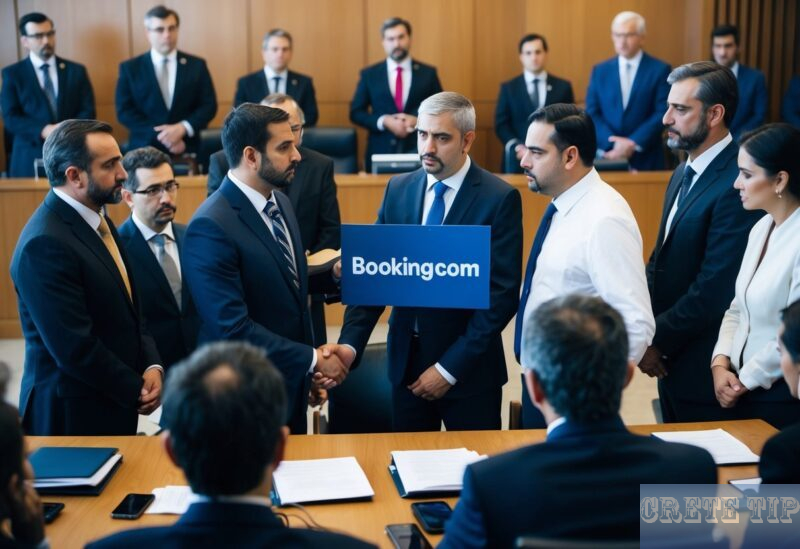Greek Hoteliers Sue Booking.com and other online travel agencies Over Commission Disputes.
Overview
The Challenges
Greek hoteliers are currently seeking compensation from Booking.com and other online travel agencies (OTAs) due to a recent ruling by the European Court. This ruling grants businesses the ability to set their own pricing strategies without being bound by restrictive clauses imposed by these platforms. Alexandros Vassilikos, the president of the Hellenic Chamber of Hotels, has announced plans for class action lawsuits against these digital giants. He emphasized the collaboration with specialized legal firms to ensure these actions are executed effectively.
Vassilikos pointed out that the hospitality sector is facing significant distortions caused by the dominating position of OTAs. He labeled certain practices as “illegal”, arguing that they limit hotel owners’ capabilities to sell their services at preferred prices. The recent legal developments are intended to create a more transparent and fair environment in the tourism sector.
New Phase of ‘Tourism for All’
The recent court decision marks the beginning of a new phase in the campaign for more equitable conditions within the Greek tourism industry. With the elimination of rate parity clauses, which have historically constrained hotel pricing, hoteliers can now directly influence their own pricing models. This scenario is expected to cultivate healthy competition among hotels, benefiting consumers through potentially lower prices and greater choice.
This shift opens avenues for hoteliers to adopt innovative pricing strategies and respond to market demands more effectively. As they regain control over their pricing, the sector can anticipate a transformation in the dynamics of online distribution channels, promoting a healthier ecosystem within the European tourism landscape.
The Moment of Truth Has Arrived
G. Chatzis, a prominent figure in the Greek hospitality sector, has proclaimed that the time has come for significant changes in how OTAs operate. The call for action is driven by the belief that many practices employed by these platforms infringe on fair competition and can lead to a negative impact on local businesses. The commitment to challenge these unfair practices has never been more resolute, highlighting the need for compliance with the Digital Marketing Act (DMA).
Chatzis’ statements reflect a growing concern among hoteliers regarding the unfair business practices that have proliferated within the online travel agency market. The expectation is that with the European Commission’s renewed focus on enforcing competition law, the hospitality industry can move towards a more equitable environment that fosters transparency and ensures compliance with the newly established regulations. The ramifications of these developments are pivotal for maintaining a competitive tourism ecosystem in Greece.
Frequently Asked Questions
What steps should be taken to file a complaint against Booking.com?
To file a complaint against Booking.com, a costumer should first gather all relevant documentation, including contracts and communication with the platform. They can then visit the official Booking.com support page to submit their complaint. It’s important to clearly outline the issue, provide evidence, and specify the desired resolution.
How can a costumer pursue compensation for alleged misconduct by Booking.com?
Hoteliers can seek compensation by documenting instances of unfair practices and reaching out to Booking.com directly for resolution. If direct communication fails, they might consider escalating the matter through a consumer protection agency or exploring legal avenues for compensation based on contractual agreements and unfair trading practices.
What procedure must be followed to obtain a refund from Booking.com?
To secure a refund from Booking.com, the individual should first check the booking conditions to ensure eligibility. They can then initiate the refund request through the website or app, providing the required booking details. If the process is unclear, contacting customer support may be necessary for additional assistance.
Who owns Booking.com and what is its parent company?
Booking.com is owned by Booking Holdings Inc., which is a major player in the online travel industry. This company also owns other travel websites and services, enhancing its influence in the global market.
What legal recourse is available to hoteliers if they suspect a breach of contract by Booking.com?
If a hotelier believes that Booking.com has violated their contractual obligations, they can first attempt to resolve the issue through negotiation. If that fails, they may consider seeking legal advice to understand their options, which could include filing a lawsuit for breach of contract in a relevant court.
What entitlements do hoteliers have when dealing with price parity challenges from online travel agencies like Booking.com?
Hoteliers have the right to negotiate terms regarding price parity clauses in contracts with online travel agencies. They can seek legal advice to understand their rights and may challenge such clauses if they believe they are restrictive or anti-competitive. It’s essential for hoteliers to remain informed about their legal rights in these situations.





